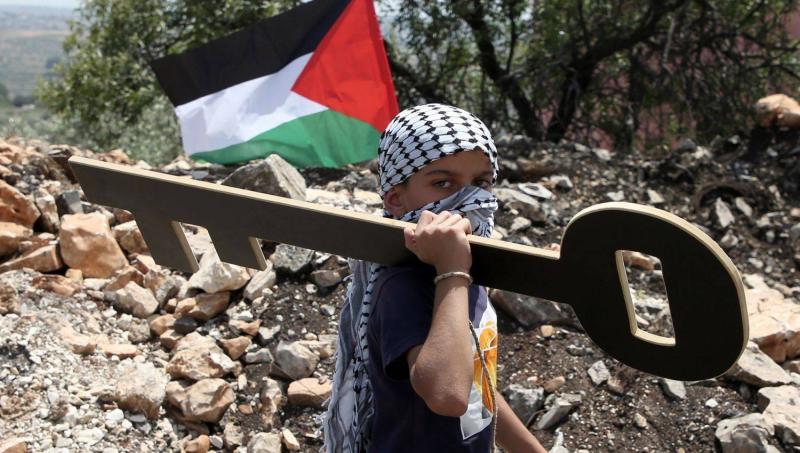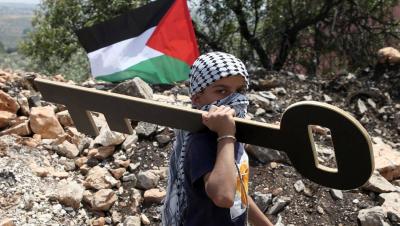For decades, Palestinian refugees have kept the keys to their homes from which they were displaced during the Nakba of 1948, relocating to several neighboring and distant countries. Following the ongoing Gaza war, another key has joined their series of pains, reminding the residents of the sector of their tremendous loss and bitterness, and making them cling even more fiercely, despite the anguish and sorrow, to the hope of returning to their homes, even if it takes time.
From one displacement to another, and from one death to another, they still hold the keys to their houses, hoping to return and rebuild after war has turned their homes into rubble and destruction over the past nine months.
**Determination to Return**
Hassan Nofal, one of those enduring the bitterness of living and repeated displacement in Gaza, holds onto two keys in a chain he clings to—one for his grandparents' house, from which they were expelled in southern Israel after the 1948 Nakba, and the other for his devastated home in northern Gaza, which he was forced to flee last year after the outbreak of war.
Over the past nine months, Nofal and his family have had to be displaced four times due to Israeli bombings and attacks. Yet, he asserts that the key should not turn into another mere memento, like his grandparents' house key. He said, “If the key to my home becomes just a memory as I grow older, then I no longer want to live; I must return to my home... I want to stay in Gaza and settle down with my children in our house.”
Virtually no one in all of Gaza remains in their place, having not been displaced at least once. Reports confirm that the majority of the population has been displaced multiple times, moving from one tent to another and from one temporary shelter to another, which might become a target for Israeli shelling, causing death to all within it.
United Nations schools and destroyed houses testify to the bitterness of displacement, as they have opened their doors to the homeless since the beginning of the war. In each new displacement, Palestinian families are compelled to fight anew for survival, holding on to some of their essential possessions to withstand the pervasive threat of death.
**From One Displacement to Another**
In the latest wave of displacement, hundreds of thousands from the sector moved towards the city of Khan Younis following an Israeli order demanding everyone to evacuate quickly. Due to the cramped conditions and loss of essential living elements, nearly everyone is crowded in an area Israel claims is safe, known as Al-Mawasi, which extends over approximately 60 square kilometers on the Mediterranean coast.
Despite being classified as safe, Israel has launched deadly airstrikes on Al-Mawasi, worsening the dire conditions in its sprawling makeshift camps, lacking basic sanitation systems, increasing the risk of spreading diseases, especially amid severe food and clean water shortages.
Nofal, a 53-year-old employee in the Palestinian Authority, recounted that he fled with his wife and six children from their home in the Jabalia refugee camp in northern Gaza in October. They first moved to the city of Deir al-Balah in central Gaza, then to Rafah in the southern part, and had to flee once again during an Israeli attack there in May, finally moving to Khan Younis, and just last week, they fled from Khan Younis to a tent in Al-Mawasi.
He said, “With each new displacement, it is hard to manage with insects and live on sandy ground. We get sick because it becomes hot during the day and a little cold at night.” He added that the initial displacement from his home in Jabalia was the hardest, as it now adds another key to his collection, alongside the key to his grandparents' home from the village of Al-Halaqat, displaced in 1948.
**Precious Symbols**
Such old keys are considered valuable symbolic possessions for the grandchildren of Palestinians who were expelled or fled during the conflict that followed the establishment of Israel. Many in Gaza fear a repeat of the 1948 Nakba, being deprived once again of their right to return to their homes.




